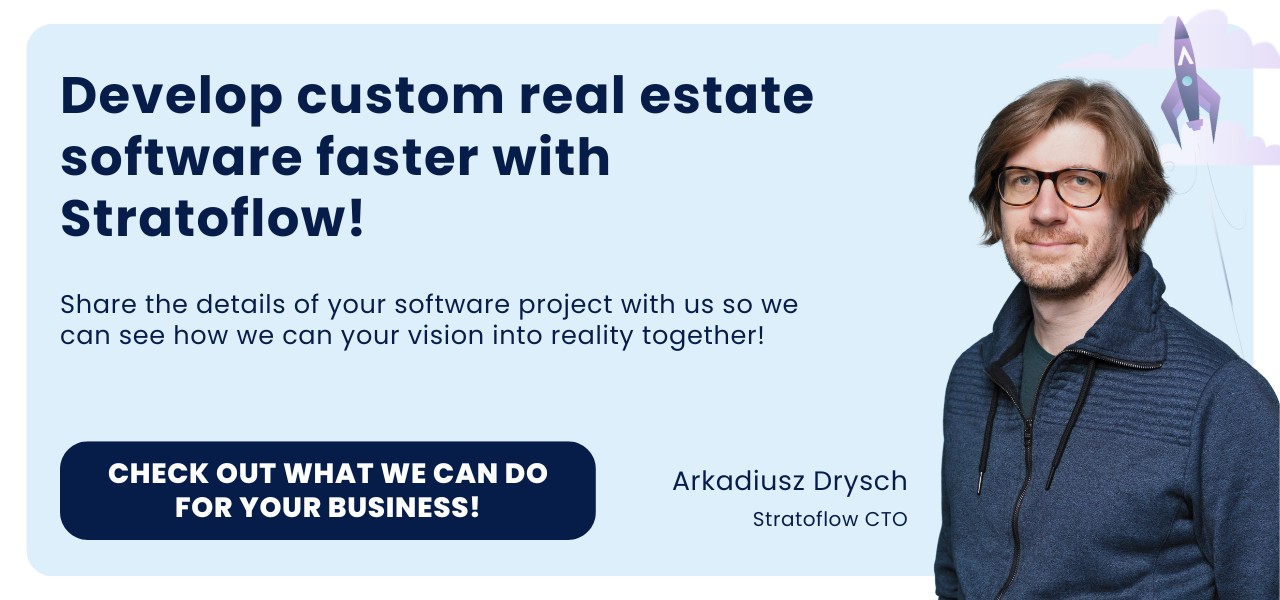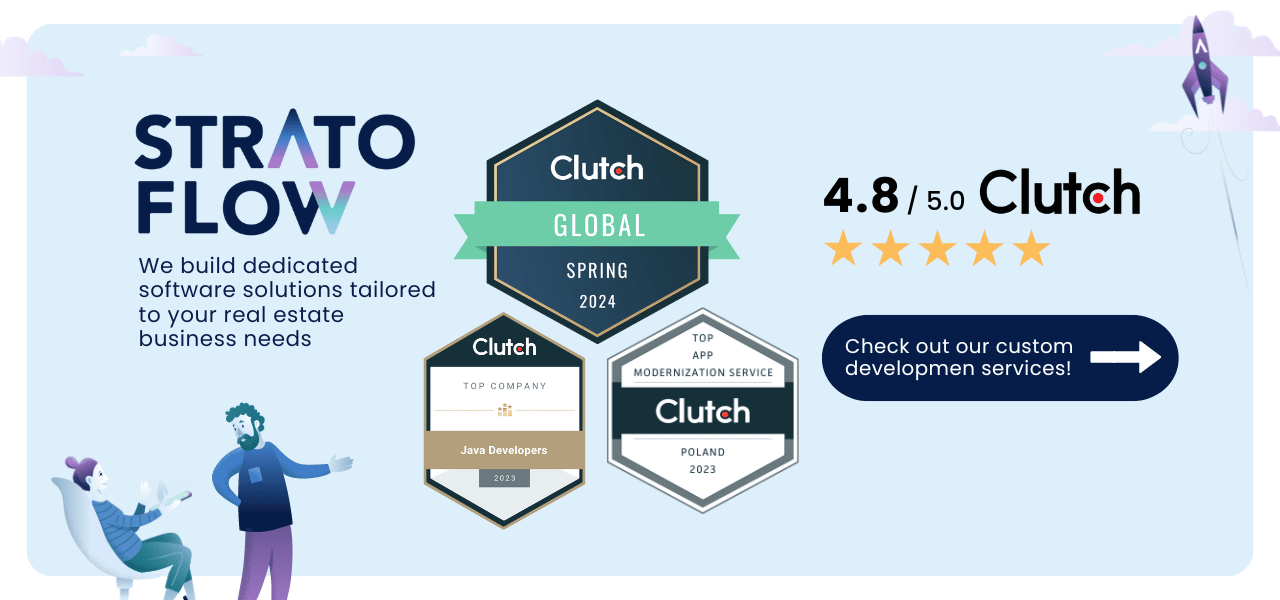
10 Proptech Trends Transforming Real Estate Industry in 2025
The real estate industry is undergoing a technological revolution that is addressing many of the inefficiencies and challenges facing professionals today.
From streamlining property management to enhancing the customer experience through personalization, modern technology is transforming every facet of real estate.
As you explore the most impactful innovations driving this change, discover how these trends can help you stay ahead in a competitive marketplace by leveraging advanced solutions tailored to meet the evolving needs of the industry.
The Real Estate Market is Evolving: Be Prepared!
In recent years, the real estate market has evolved at an unprecedented pace, driven by innovative proptech solutions that are revolutionizing every aspect of the industry.
For real estate professionals, staying ahead of these trends is no longer optional, but essential to maintaining a competitive edge.
Embracing the latest real estate software and technology solutions can streamline operations, enhance the customer experience, and ultimately increase profitability.
From leveraging AI for personalized marketing to integrating smart home technologies for improved efficiency, the potential benefits are vast and transformative.
Now is the time to explore these advancements and prepare your business for the future of real estate.
Key drivers of digital acceleration in proptech
Digital transformation in the real estate industry is being driven by several key factors that are reshaping the way business is done.
Among the most influential are artificial intelligence, customizable software, and personalization.
Each of these drivers offers unique benefits and capabilities that are revolutionizing the industry, making it more efficient, responsive, and customer-centric.
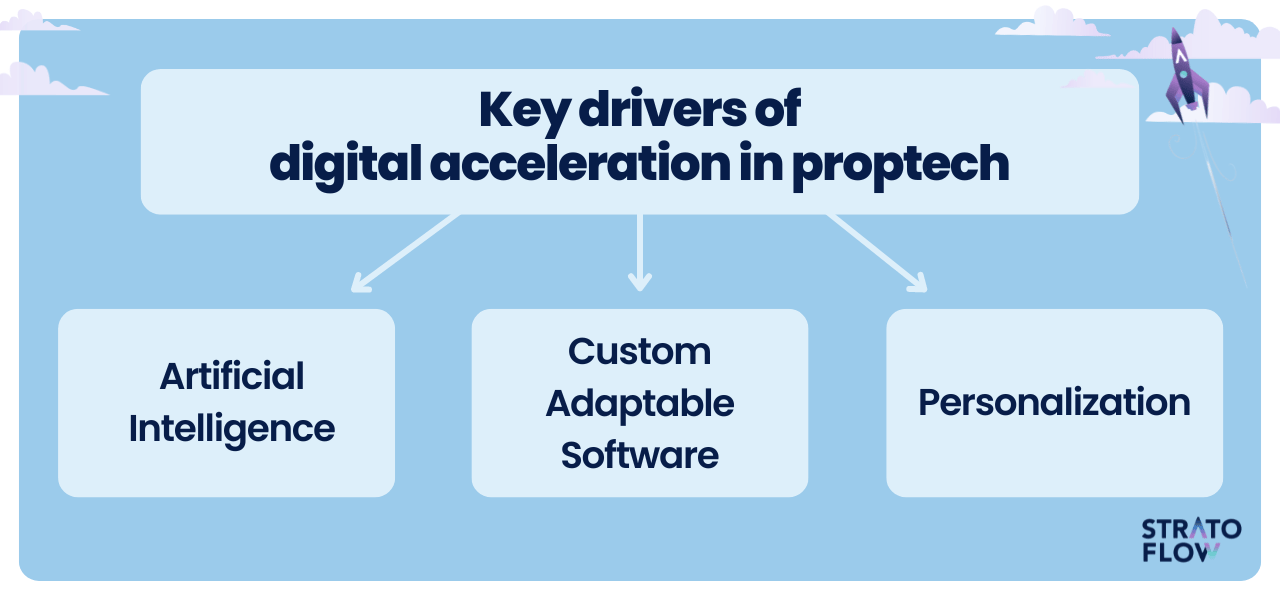
Artificial Intelligence
Artificial intelligence (AI) is playing a transformative role in the real estate industry by enhancing data analysis, improving decision-making processes, and automating routine tasks.
AI-powered tools such as predictive analytics and machine learning algorithms can sift through vast amounts of data to identify market trends, forecast property values, and optimize pricing strategies.
For example, AI can predict which neighborhoods are likely to appreciate based on historical data and economic indicators, providing invaluable insights for investors and real estate professionals.
In addition, AI-powered chatbots and virtual assistants are improving customer service by providing instant responses to inquiries, scheduling showings, and managing follow-ups, streamlining the customer engagement process.
Custom Adaptable Software
The demand for custom adaptable software in real estate is increasing as businesses seek tailored solutions that address their specific operational needs.
Unlike generic software, custom solutions are designed to integrate seamlessly with existing systems and workflows, offering functionalities that are precisely aligned with business requirements.
These software solutions for real estate brokers can manage everything from property listings and client databases to transaction processing and maintenance scheduling.
By using adaptable software, real estate companies can achieve greater operational efficiency, reduce costs, and improve overall service delivery. Moreover, custom software can scale with the business, allowing for adjustments and enhancements as the company grows and evolves.
Personalization
Personalization is becoming a critical component of the real estate industry, driven by the need to deliver tailored experiences to customers.
By leveraging data analytics and AI, real estate platforms can offer personalized property recommendations, marketing content, and communication strategies that are tailored to each customer’s unique preferences and behaviors.
This level of personalization not only improves the customer experience, but also increases engagement and conversion rates.
For example, a personalized marketing campaign might highlight properties that match a buyer’s previous search criteria, or provide updates on price changes and new listings that match their preferences. Personalization helps build stronger customer relationships and fosters loyalty by showing customers that their needs and preferences are understood and valued.
Key Proptech Trends You Need To Know in 2025
The real estate landscape is undergoing a significant digital transformation, driven by technological advancements.
From adaptive property management solutions to smart homes and building management systems, these top 10 proptech trends are redefining how real estate is managed, marketed, and experienced.
This comprehensive list explores the most impactful trends that will shape the future of real estate in 2025 and beyond.
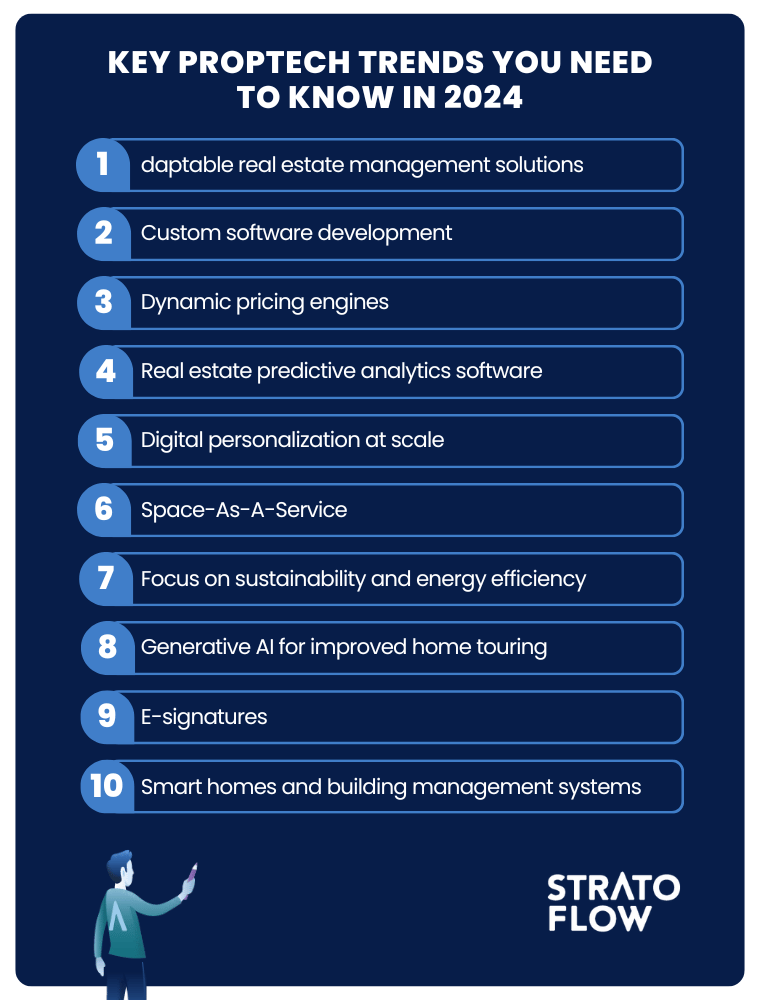
Adaptable real estate management solutions
Using outdated management solutions or Excel spreadsheets can significantly hinder business performance in the real estate industry.
These tools are often inefficient, error-prone, and lack the advanced functionality needed to effectively manage complex real estate portfolios.
Enter modern property management software solutions, which provide comprehensive tools to improve efficiency, accuracy and overall business performance.
One notable example of such software is Openkoda, a robust and flexible open source real estate platform tailored for real estate companies in both residential and commercial real estate.

Some key features of Openkoda include:
- Custom Dashboard: Provides real-time updates on rent payments, smart reminders, and AI-powered email systems to ensure timely collections and reduce overdue payments.
- Tenant Screening: Implements detailed screening processes to assess tenant reliability, reducing the risks associated with property damage or unpaid rent.
- Maintenance Management: Allows tenants to report issues through the platform, avoiding duplicate requests and streamlining communication between tenants and maintenance teams.
- Automated Document Generation: Automates the creation of leases, invoices, and receipts, saving time and reducing manual errors.
- AI Messaging: Enhances communication with an AI-powered messaging system that organizes and manages tenant and contractor communications efficiently.
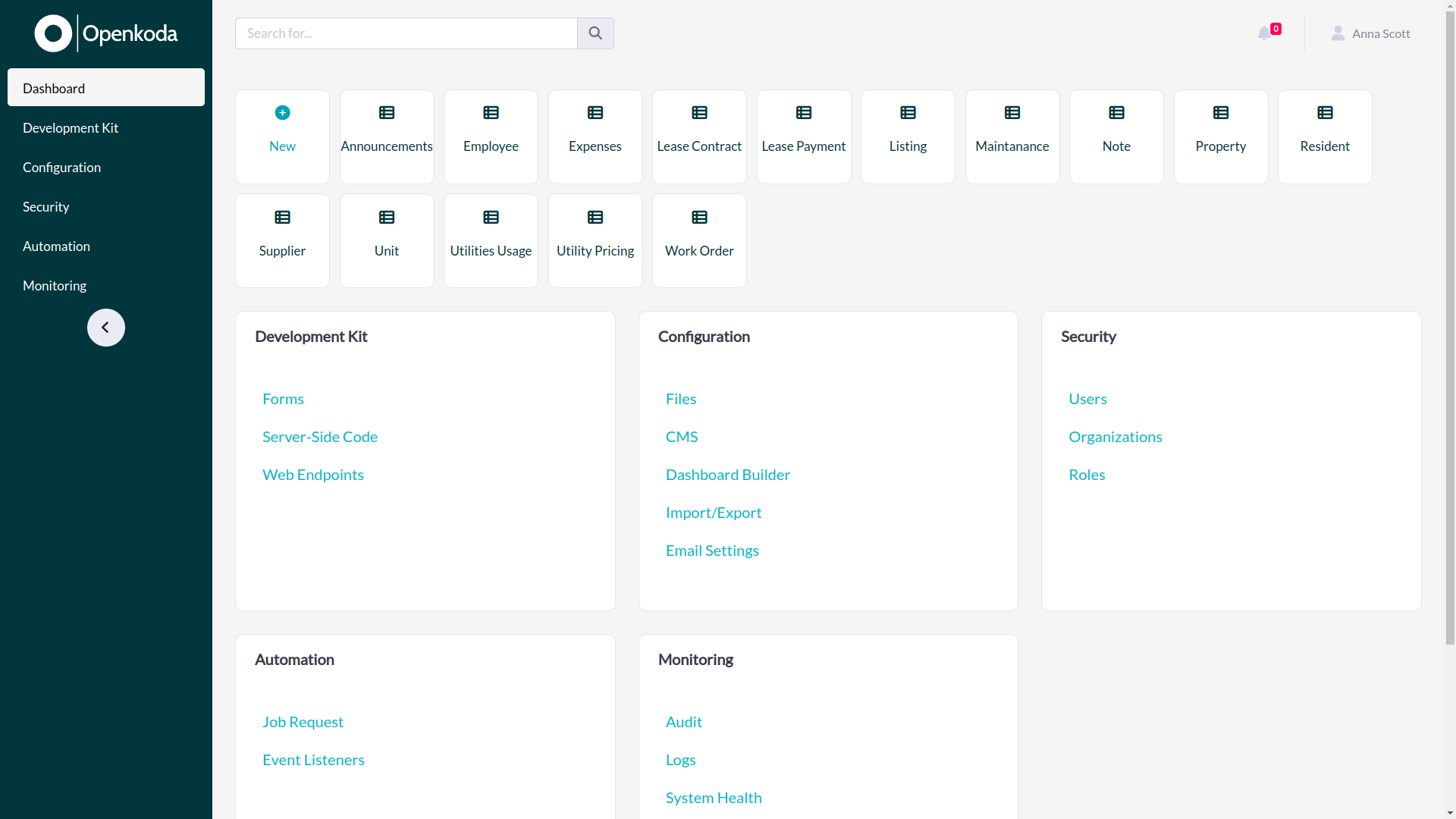
But perhaps the most important feature of Openkoda is its flexibility.
Because it is open source, it allows real estate professionals to extensively customize the software, adding or modifying features to meet specific business needs.
This capability is a significant advantage over traditional software solutions, which often come with vendor lock-ins and limited customization options.
With Openkoda, users have complete control over the code, enabling them to build custom applications up to 65% cheaper and faster than traditional custom software development processes.
More robust applications that can save tens of thousands of dollars.
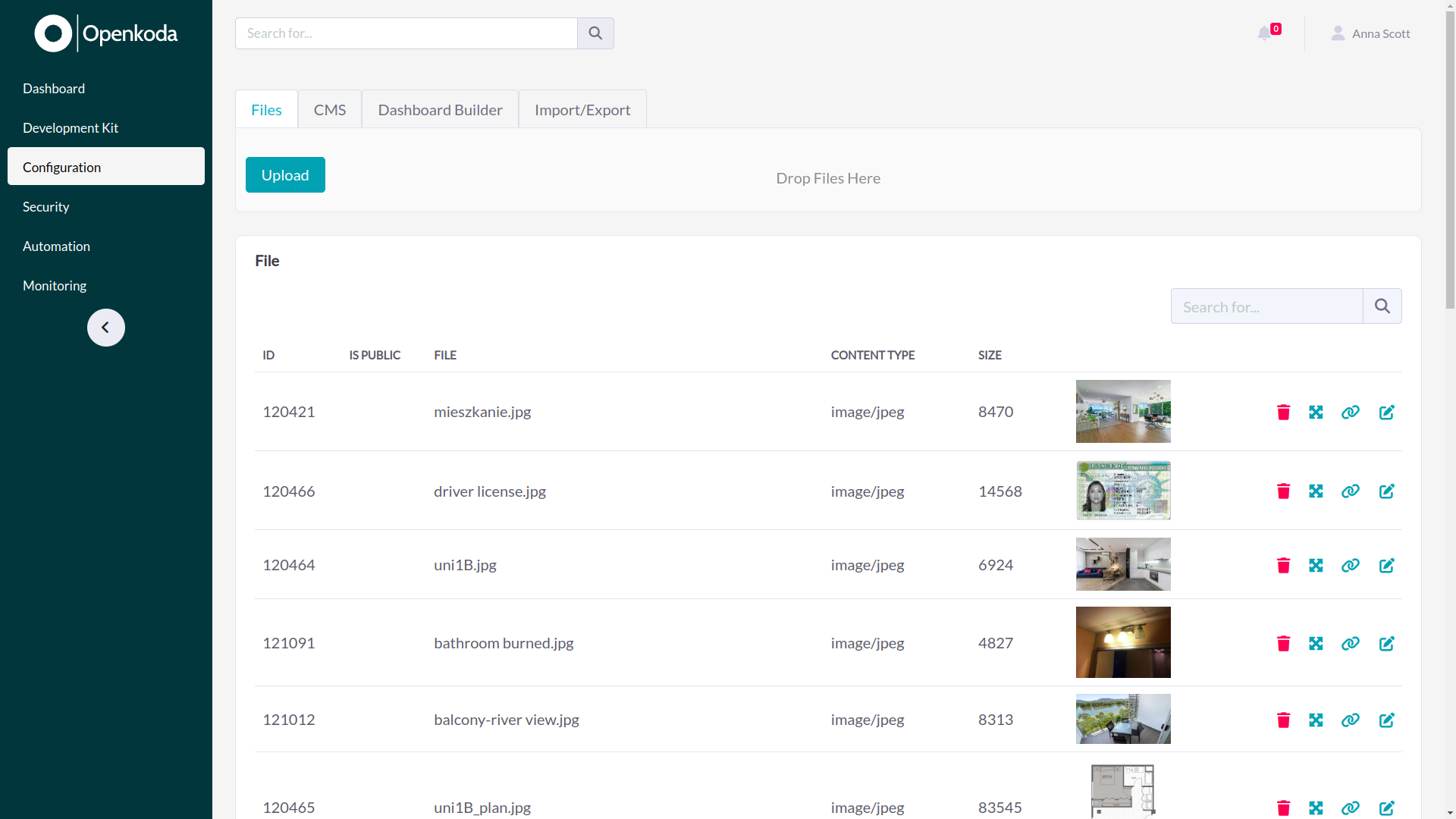
Overall, property management software like Openkoda can transform real estate operations by reducing manual work for real estate agents, improving accuracy, and increasing tenant satisfaction.
Openkoda is a ready-made tool available today! Do you want to see its capabilities in action?
Schedule your own free demo today!
Custom software development
Choosing custom software solutions offers significant advantages over out-of-the-box options, especially in the dynamic real estate industry.
One of the primary benefits is the customization that custom software provides.
Unlike generic software that offers broad functionality, custom solutions are designed specifically to meet the unique needs of your business. This ensures greater efficiency and better performance because the software is perfectly aligned with your operational processes.
Scalability is another key benefit of custom software. As your business grows, your software must grow with it.
Integration capabilities are also greatly enhanced with custom software. It can seamlessly integrate with your existing systems, such as accounting software, real estate CRM software, or other property management systems.
Stratoflow: Your Partner in Custom Real Estate Software Development
Stratoflow is a reputable proptech real estate tech partner for developing high-performance custom software solutions for the real estate industry.
We specialize in creating bespoke software that meets the unique needs of real estate businesses, ensuring that your operations are efficient, secure, and scalable.
Our expertise includes:
- Custom Real Estate Software Development: We offer tailored software solutions for finance, travel, e-commerce, and healthcare, ensuring precision and efficiency in addressing specific client needs.
- Java Development: Our dedicated Java teams create robust, scalable applications and provide nearshore outsourcing of skilled developers.
- AI and ML Systems: We develop advanced AI and ML systems like personalized recommendation engines and data analytics platforms to enhance business automation.
- System Integration: We provide comprehensive system integration services, including point-to-point, vertical, star, and horizontal approaches, optimizing data flow and reducing manual processes.
- Cloud-Native Solutions: We build high-performance, horizontally scalable cloud platforms capable of handling massive data and transactions, such as processing over a billion financial transactions per hour.
Ready to transform your real estate software with cutting-edge technology?
Contact us to discuss how our tailored solutions can elevate your business and streamline operations.
Dynamic pricing engines
Another proptech trend closely related to artificial intelligence technology is the increasing use of dynamic pricing engines.
Customized pricing engines can significantly increase revenue by ensuring that properties are priced optimally at all times.
By continuously analyzing market data and dynamically adjusting prices, property managers can achieve the highest possible rental or sale price, maximizing profitability.
For example, properties listed with dynamic pricing strategies have shown an increase in rental income of up to 10-15% compared to static pricing models.
These engines also allow real estate companies and property owners to track property transactions and respond quickly to market fluctuations. Whether it’s a sudden spike in demand during peak season or a market downturn, dynamic pricing engines adjust prices in real time to reflect current conditions.
This adaptability helps maintain occupancy rates and ensures that properties are neither underpriced nor overpriced.
The impact of dynamic pricing engines on the real estate market is profound.
According to recent industry reports, incorporating advanced pricing technologies has become a key trend for 2025, with a significant number of real estate firms adopting these systems to stay competitive.
The National Association of Realtors (NAR) highlighted that properties using dynamic pricing tools have seen improved market performance and higher occupancy rates.
Real estate predictive analytics software
Predictive analytics software is revolutionizing the real estate sector by providing powerful tools for forecasting market trends, optimizing pricing strategies, and assessing risk.
Predictive analytics tools analyze historical data, market trends, economic indicators, and social media activity to anticipate future real estate market conditions.
With this capability, real estate professionals can determine which neighborhoods are likely to experience the greatest appreciation in property values or identify emerging market trends.
Predictive analytics is also invaluable for assessing the risks associated with real estate investments. These tools can analyze factors such as property condition, location risk, market stability, and economic indicators to assess potential investment risks.
The overall market for predictive analytics software is experiencing rapid growth.
According to recent data, it is expected to grow from $7.32 billion in 2019 to $35.45 billion by 2027, underscoring its increasing importance across the real estate industry.
A study by KPMG highlighted that companies using predictive analytics in commercial real estate have seen significant improvements in project delivery and cost management, with 69% of projects coming in within 10% of their proposed budgets.
Digital personalization at scale
Dynamic pricing and advanced analytics are not the only areas in real estate sector where AI is playing an important role. There’s also personalization-the art of tailoring the content viewed online to the needs and preferences of each individual user.
Just as personalized content has become a cornerstone of e-commerce, it is now transforming the real estate industry by creating tailored experiences for potential buyers and renters.
Real estate personalization in action
Imagine a real estate platform that uses real estate AI to analyze a user’s search history, preferences, and interactions on the site.
This data allows the platform to recommend properties that match the user’s criteria, such as location, price range, property type, and even specific amenities.
For example, if a user frequently searches for properties with swimming pools in a particular neighborhood, the system can prioritize showing similar listings to improve the property search process.
In addition, the platform can personalize communications, sending emails or notifications about new listings that match the user’s profile or price changes for properties they have shown interest in.
How can a system like this affect conversion rates?
First of all, personalized content has a significant impact on purchase decisions. For example, according to Instapage, personalized home pages influence 85% of customer purchase decisions, and 56% of online shoppers are more likely to return to sites that offer personalized recommendations.
Companies that excel at personalization generate 40% more revenue from these activities than average players.
According to McKinsey, 71% of consumers expect companies to deliver personalized interactions, and 76% are frustrated when this does not happen.
If you want to introduce personalized recommendations to your real estate business, contact us today!
At Stratoflow, we have a lot of experience building custom personalization engines for different types of businesses and will be able to tailor it exactly to your needs and specifications.
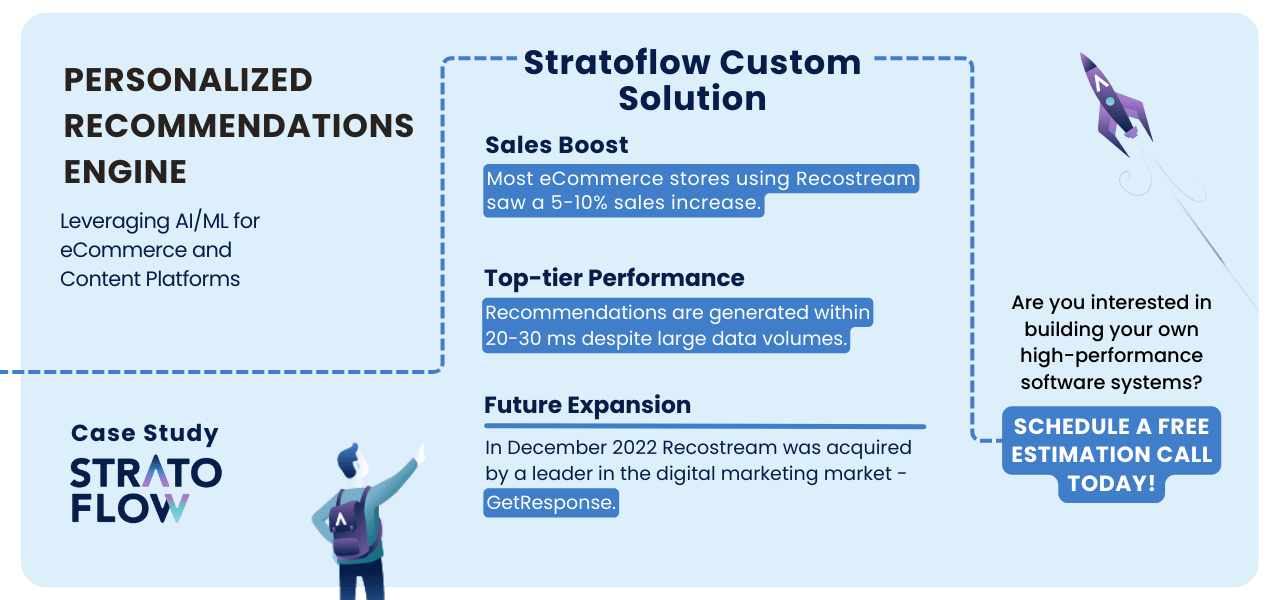
Space-As-A-Service
Space-As-A-Service (SPaaS) is a transformative trend in the real estate industry, where physical space is offered on flexible, on-demand terms rather than through traditional long-term leases.
This model aligns with the broader “as-a-service” economy seen in other sectors, where users pay for access to services rather than owning assets outright.
Key benefits of Space-As-A-Service (SPaaS) approach
SPaaS gives users the ability to scale their space requirements up or down based on their current needs. This is especially beneficial for startups, freelancers, and businesses experiencing rapid growth or seasonal fluctuations.
By offering space on a flexible, as-needed basis, SPaaS helps companies avoid the high upfront and ongoing costs associated with traditional leasing.
This model also allows companies to pay only for what they use, optimizing operating costs.
For example, a pop-up retail store can lease a prime location for a few months during peak shopping seasons, maximizing profitability while minimizing costs during off-peak periods.
Outlook on the future
SPaaS is changing the demand dynamics in the real estate market. There is a growing preference for flexible, service-oriented spaces over traditional long-term leases.
This shift is prompting property owners and developers to rethink their strategies and adapt to the evolving needs of tenants.
Property owners are investing in smart building technologies, sustainable practices, and customer-centric solutions to attract and retain tenants.
Focus on sustainability and energy efficiency
As the real estate industry evolves, a significant trend gaining momentum is the focus on sustainability and energy efficiency.
This shift is being driven by increasing environmental awareness, regulatory pressures, and the economic benefits associated with green building practices.
Sustainable real estate practices not only help protect the environment, but also increase property value, reduce operating costs, and improve occupant health and satisfaction.

Energy management systems (EMS) are also part of the real estate technology space.
EMS platforms provide comprehensive monitoring and control of a building’s energy use. They analyze data from various systems (e.g. lighting, HVAC) to identify inefficiencies and suggest corrective actions. EMS can result in energy savings of up to 30%.
BMSs integrate various building systems (HVAC, lighting, security) into a single platform for centralized control and optimization. This integration ensures that all systems work in harmony to reduce energy consumption and improve building performance.
Personalized dashboards give tenants and property managers insight into their energy consumption patterns. These dashboards can provide tips and recommendations to reduce energy consumption, increase user engagement, and promote sustainable behaviors.
Generative AI for improved home touring
Another trend on the list that is having a significant impact on the real estate industry is the use of generative AI.
AI – especially the breakthroughs in generative AI that have been made in the past year or so – is poised to revolutionize not only the way we create content, but also the makeup of our economies and societies as a whole.
Things are moving fast, so what does the near future hold for the real estate industry?
In the near future, we may see more sophisticated uses of virtual staging, where AI can generate highly realistic and customizable images of interiors, furniture, and decor without any physical staging.
This capability will allow potential buyers to visualize different design options tailored to their tastes and needs, making listings more engaging and personalized.
In addition, technology could advance to the point where 3D models are automatically generated from simple 2D floor plans or even photographs.
Imagine a system that can create interactive, immersive 3D virtual property tours that potential buyers can explore from the comfort of their own homes, gaining a comprehensive understanding of the property’s layout and features.

When it comes to marketing, generative AI is already having a significant impact.
The technology is currently being used to automate the creation of marketing materials, including property descriptions, blog posts, and social media content.
For example, tools like OpenAI’s GPT-4 can generate compelling and consistent property descriptions by analyzing and learning from existing content. This not only saves time for real estate agents, but also ensures that marketing efforts are cohesive and professional.
[Read also: Your Guide to Property Management Software Development]
E-signatures
Another notable trend in proptech is the growing adoption of e-signatures, which are transforming the real estate industry by streamlining transactions and increasing efficiency.
E-signatures allow all parties involved in a real estate transaction to digitally sign documents, eliminating the need for physical paperwork and significantly speeding up the process.
Advantages of E-Signatures
- Faster Turnaround Times: Traditional paper-based processes often involve multiple steps such as mailing, printing, and in-person signings, which can take weeks. E-signatures enable documents to be signed and returned almost instantaneously, reducing transaction times significantly.
- Reduced Errors and Increased Accuracy: E-signature platforms ensure that all required fields are completed before a document can be finalized, reducing the likelihood of errors and omissions.
- Enhanced Security: E-signature technologies provide robust security features, including encryption, two-factor authentication, and audit trails.
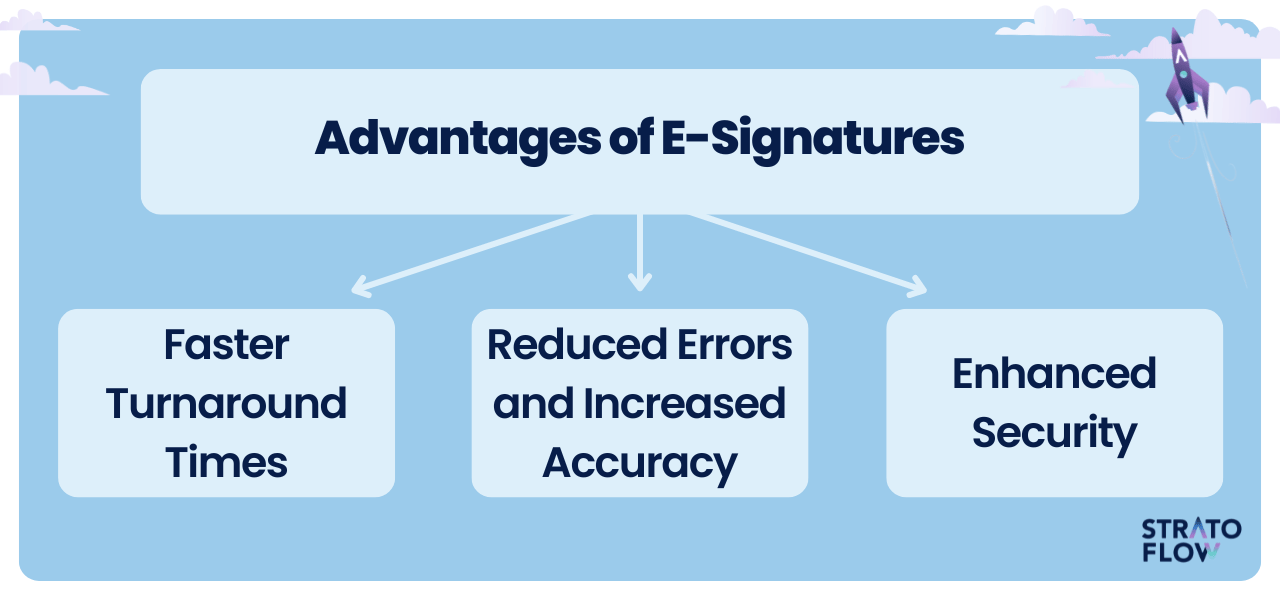
Integration with Smart Contracts
E-signatures also pave the way for the integration of smart contracts in real estate transactions.
Smart contracts are self-executing contracts where the terms of the agreement are written directly into the code.
They automatically enforce and verify compliance with contract terms, reducing the need for intermediaries and further increasing the speed and security of transactions.
Combining e-signatures with smart contracts can further streamline real estate processes and provide a seamless, automated transaction experience.
[Read also: Best Real Estate ERP Software Solutions On The Market in 2024]
Smart homes and building management systems
The integration of smart homes and building management systems (BMS) is the latest notable trend reshaping the real estate industry.
This trend leverages the Internet of Things (IoT) to improve efficiency, security, and convenience in both residential and commercial properties.
Building Management Systems (BMS) are sophisticated systems that control and monitor a building’s mechanical and electrical equipment, such as ventilation, lighting, power, fire and security systems.
A BMS ensures that these systems operate efficiently and safely, providing a comfortable environment for occupants while reducing energy consumption and operating costs.

Combining IoT devices with Building Management Systems (BMS) can significantly enhance the operational efficiency of buildings.
IoT sensors and smart meters provide real-time data on energy usage, which the BMS analyzes to optimize energy consumption, such as adjusting lighting and HVAC systems based on occupancy and weather conditions.
This integration can reduce energy use in commercial buildings by up to 30%.
The integration of IoT with BMS provides valuable data-driven insights into building performance and occupant behavior, enabling further optimization and improved efficiency.
[Read also: Top 8 HOA Management Software Solutions: A Comprehensive 2024 Guide]
Embracing the future of property technology – key statistics for the future
In conclusion, the impact of real estate technology (proptech) on business efficiency, sales, and conversion rates in the real estate industry is profound and transformative.
To summarize, here is a list of key statistics about the proptech industry and how some of the technologies mentioned in this article can impact business performance.
- The global proptech market was valued at $25.1 billion in 2021 and is expected to grow at a compound annual growth rate (CAGR) of 15.8% from 2022 to 2030.
- The property maintenance software market was valued at $4.47 billion in 2022 and is anticipated to grow at a CAGR of 8.1% from 2023 to 2030
- The global market for AR and VR in real estate is expected to grow at a CAGR of 38.12% until 2028
- AI-driven solutions streamline numerous administrative and operational tasks, such as client management, offer management, and predictive maintenance.
- The average conversion rate for real estate websites is approximately 2.9%. However, well-optimized digital strategies, including SEO and targeted marketing, can push this rate higher. For instance, conversion rates can reach up to 3.5% with effective use of AI and personalized marketing tactics.
- Virtual reality (VR) tours and AR staging have been shown to increase sales conversion rates by up to 20%, as these technologies allow prospective buyers to explore properties conveniently and visualize their potential.
Related Posts
Thank you for taking the time to read our blog post!

